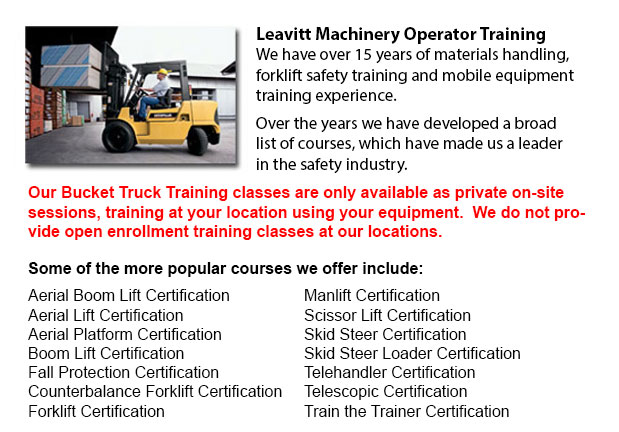
Marysville Bucket Truck Training - The bucket truck training program is a program which is intended to efficiently train qualified operators so they could reduce the chance of incident and personal injury when working with or in close proximity to bucket trucks or likewise referred to as vehicle-mounted aerial work platform. An aerial lift device refers to any vehicle-mounted device, articulating or telescoping, or both, that is used to position employees to reach locations which would otherwise be inaccessible. Aerial lift devices are used to be able to elevate employees to above-ground work locations.
The goal of the program is to provide operators with the skills, knowledge, abilities, and training materials needed to be able to learn to operate vehicle-mounted aerial work platforms effectively and safely.
The program has two parts: a hands-on session and a classroom training session. In order to become certified, participants need to be successful in both parts. A wallet-size certificate and a full-size certificate will be given upon completing the program.
The types of lifts examined in the program consist of Aerial lift devices are normally constructed with wood, metal, reinforced plastic, fiberglass or other materials.
Definitions
Articulating boom platform: multiple hinged boom parts.
Extensible boom platform: has an extensible or telescopic boom.
Platform: the part of an aerial device which is designed to carry employees.
Mobile unit: any aerial device together with its parts like for example vehicle and related machine.
Employers have the responsibility to ensure their worker get proper training prior to operating aerial devices. Employees should make sure they likewise obtain the needed training and that they do not operate lift devices if they are not authorized to do so. Employees must make sure that they wear the right protective equipment when working from the platform.
Course content comprises operation of the vehicle-mounted aerial work platform, pre-shift inspection, safe operating practices, use of emergency controls, lifting capacity, and administering practical and theory tests. Operators would become familiar with rules under the federal and local regulations.
-
Mount Vernon Loader Operator Certification
Marysville Loader Operator Certification - What It Truly Takes To Have A Loader Operator Certification - Certification for forklifts are required to guarantee the safe use of forklifts for those employers in warehouse, construction and industrial set... More -
Mount Vernon Forklift Training Program
Marysville Forklift Training Program - The forklift is a common powered industrial vehicle which is in wide use nowadays. They are occasionally referred to as jitneys, hi los or lift trucks. A departments store will utilize the forklift to be able to... More -
Mount Vernon Forklift Certification Schools
Marysville Forklift Certification Schools - In North America, forklift certification is mandatory, making forklift training programs essential for both the business and their workers working as operators of forklifts. Forklift training focuses on saf... More -
Mount Vernon Manlift Operator Certification
Marysville Manlift Operator Certification - Our aerial lift and scissor platform training and certification empowers those participating with a general understanding and knowledge of the efficient and safe operation of "Power Operated Mobile Work Pla... More -
Mount Vernon Boom Lift License
Marysville Boom Lift License - Only completely qualified individuals should operate an aerial boom lift. Qualification can be obtained through a combination of classroom sessions and practical training with the particular kind of aerial lift which wi... More -
Mount Vernon Manlift Training
Marysville Manlift Training - Different manlift training programs include the review and content of manlift devices. An important part of the course is the practicum where students demonstrate their practical ability and knowledge to safely operate a... More -
Mount Vernon Crane Training Schools
Marysville Crane Training Schools - We have designed many Mobile Crane Operation programs at our Crane Training Schools. These programs are recommended for the skilled operator who needs re-certification or certification, and for inexperienced operat... More -
Mount Vernon Loader Training
Marysville Loader Training - Loader Training - People wanting work in businesses which operate lift trucks should undergo a Loader Training program before becoming a certified operator of a lift truck. There are numerous ways to go about acquiring Lo... More

Forklift Certification Mount Vernon
TOLL FREE: 1-888-254-6157
Unit D, 1117 Dale Lane
Mount Vernon, Washington
forkliftcertificationmarysville.com/
Email Us
About Us


